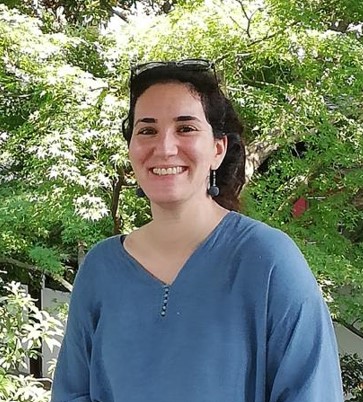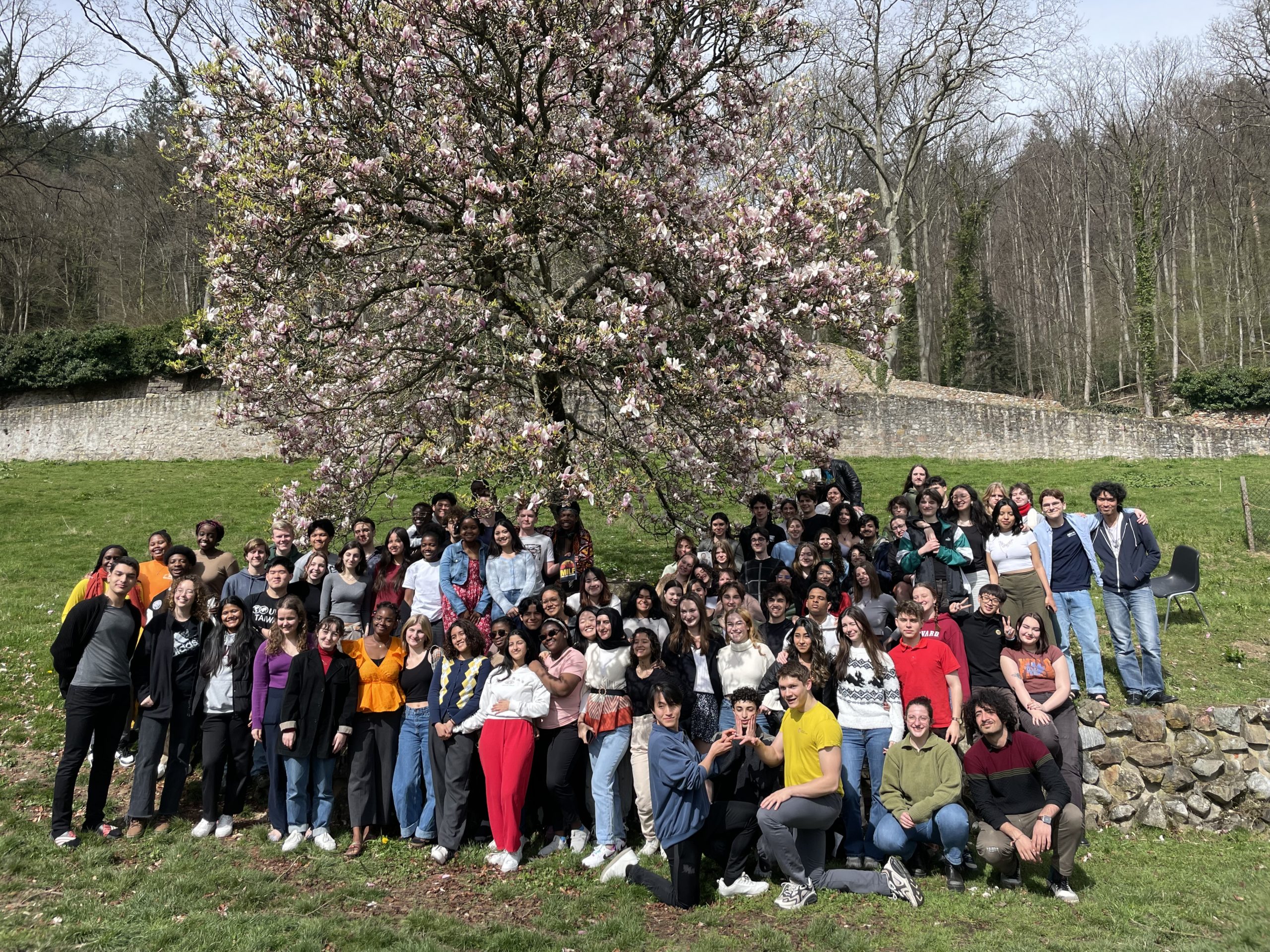Teaching and House Tutoring at RBC: “An experiment in community living”

Cassandra Poyiadjis-Osler has been teaching Global Politics and Geography at UWC RBC for three years, in addition to being a House Tutor. In summer 2024, she will take on the role of Director of Student Life at RBC. In this interview, she shares her passion for teaching and why student contact beyond the classroom is so important.
Cassie, your passion for global politics goes a long way back – can you share with us how it has developed?
The subject that inspired me the most as a student at UWC Atlantic was Peace and Conflict, the precursor of today’s IB subject Global Politics. My teacher back then was Lodewijk van Oord, who is now the Head at UWC Maastricht. I found Peace and Conflict so important as it is about understanding why and how humans can be capable of violence. And how we – by understanding that – can then work to prevent violence, to end war and promote peace.
When I started teaching Politics at UWC Maastricht for the first time, I immediately knew this was for me, and one of the most important subjects that we can offer at UWC.
Most important in what ways?
Our mission is around peace and sustainability, and those things are equal. Sustainability encapsulates peace, as in the sustainability of peace.
Especially at a UWC, where you have students from so many different countries learning together, you are confronted with politics in a very real way in the classroom when you are discussing it – I think that’s the key difference to other schools. When students here discuss politics or play MUN, it’s very real, because often, they come from countries hating each other.
So peace-building is really at the heart of what we do; and that doesn’t mean that students should go on to become politicians or peace negotiators; but it does mean that people should have an awareness of questions around violence and peace. It’s civil society that holds governments to account in the end; what we try and do by teaching students Global Politics is to think about their role as members of civil society.
You’ve been teaching at three UWC schools over the last 10 years, including UWC Changshu in China. How did you decide to become a teacher?
I had always wanted to be a teacher, but it took me some years to fully embrace it. Where I grew up, being a teacher was sometimes associated with failing somehow; there is a British saying, ‘If you can’t act, teach’ (laughs).
I strongly feel that this is the job for me; I have strong relationships with the students, the capacity to understand them. Teaching is much more than ’just’ subject knowledge; it’s so much about the relationships we have with the students, about making them feel comfortable in the classroom.
Obviously, one thing that I am aware of is that I am a European teaching in Europe, and teaching humanity subjects; so for me, the experience of that tiny bit of China was so important. We were there during Covid, which was obviously tough, with not being able to travel and see our families. But it was a wonderful experience.
In all your UWC jobs, you’ve also worked as a House Parent. Can you tell us a bit more about this aspect of your work?
I love House Tutoring. So often in schools, the relationship between teachers and students does become – and I believe Laurence talked about this at some point – as if we’re service providers and they’re customers. When you are a House Tutor, you can never forget the human part to each person in our community; you see them when they’re crying, and you also see them when they’re dancing crazy, and that means that, hopefully in your interactions with them, you’re able to keep that sense of humanity at the fore of how you interact with them.
Contact time is just so important. The essence of the UWC model is that students know teachers beyond the classroom walls; whether it’s in the house, in the garden, or through CAS. For me, UWC at its core is an experiment in community living.
Talking about community-living: How can House Tutors strengthen the peace-building component in the house communities?
So much progress has been made – since I was a student – in awareness around xenophobia and how students of privilege and students of less privilege interact at UWC. So much of our role is about facilitating spaces, so that students actually have deliberate conversations and get to know each other beyond their friendship groups. It’s very natural that humans form friendship groups and that we stick to them because they make us feel safe; our role is to try and give students the confidence to interact with members of the community they do not know. It’s about getting them to listen to each other; as humans we spend so much time making assumptions based on identities, for example. Our role is about unpacking those presumptions.
You’re also heading the organization of one of the school’s Special Focus Days on Inequality. How do you choose the topics to focus on for each year?
Last year, we hosted the Intersectional Feminism Focus Day. As a student, I had the baggage, as so many women do, around the word feminism. And then, when I got here, through conversations with a couple of students, I realized it’s really needed that we focus on it as a community. Again, I think that my own position as a white woman in Europe from Europe is problematic; there are so many things we take for granted, and we forget. And it’s so important for our students from this part of the world with the same background as me to realize just how much of a minority experience we have. I think that’s our biggest danger as a school, being located where we are: we become distorted in thinking this is normal; but it is not – this is minority experience.
This year, our focus was on peace and conflict. With the invasion of Ukraine and Western media in particular focusing on it, it became really important for us to create a space to talk about all conflicts in the world, because so many of our students come from countries engaged in conflict, either with internal regional or local-level conflicts or who have had past conflicts they were coming out of.
You said you like working with the students; what role do they play in organizing Special Focus Days?
It’s super important to me that these events are student-run. Because ultimately, the reason our students want to come to UWC is to talk about these topics – so therefore they should design the day.
We wanted to make space for the community to consider peace and conflict at all levels: at the interpersonal level, the community level, all the way up to the national and international level. We had 33 student-led workshops, and they put so much effort in. I really appreciate that we make space for students to do this, because it’s the most unique thing when students are teaching each other.
What teachers are not always good at is trusting students to do what they actually watch us do every single day (laughs). So they’re really the experts in how to lead a workshop, and we need to entrust them with it.
With so many students having had experiences with conflicts, what’s needed to make this learning experience work?
When you have a day like this, you’re also opening up the potential for students to be triggered, or for conflicts that are latent and underlying within the community to come to the fore; sometimes our students underestimate how difficult it is to actually work with students from countries where there is a national conflict in-between. Students can be incredibly optimistic and have the best intentions to come and present together; through that experience they generally learn that it’s really tough when everything they’ve been taught or have been exposed to – from school to the news, to their family – is how to perceive another country. When working with each other, they‘re suddenly forced to have difficult conversations. Sometimes that works, and sometimes it doesn’t. I think we should never expect students who come from countries that are in a state of conflict with each other to be friends – that’s a very dangerous presumption in UWC. They can understand and emphasize with each other; but they don’t need to become friends.
We usually highlight the benefits of teaching a diverse group of students, not looking at the challenges that lie within…..
There can be a presumption that teaching a subject like Geography or Global Politics – in a school like UWC – is easy, because we have an international classroom. But actually, for me it’s so much harder because every single student has a different frame of reference. As a teacher to be able to explain something and make it accessible to all becomes more difficult.
A diverse classroom is a wonderful thing, because students can learn about places they otherwise wouldn’t necessarily have heard about; and it’s also harder, because it requires teachers to really be willing to learn. There is so much we can learn from the students.
Cassandra Poyiadjis-Osler (Cyprus / UK)
Prior to joining UWC RBC, Cassie has worked at UWC Changshu in China for two years and at UWC Maastricht for four years, as a teacher, house parent, and Head of Department for all Group 3 (individuals and societies) subjects.
Her UWC journey began as a student at UWC Atlantic from 2006-2008. After studying International Relations and Development and experimenting with journalism, Cassie left her corporate job at age 25 to start her teacher training; she’s been teaching at UWCs since age 26 – with a passion for international relations and global politics. At RBC, she additionally coordinates the annual Inequality Special Focus Day – with a focus on Intersectional Feminism last year and Peace and Conflict this year.

